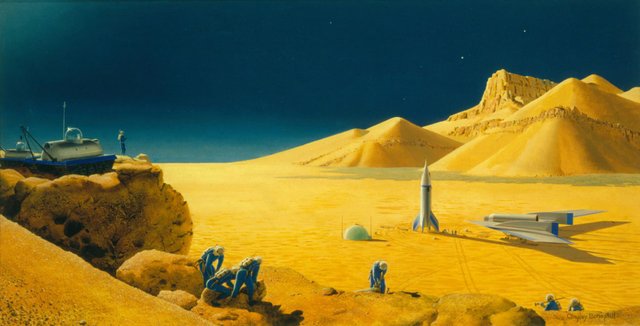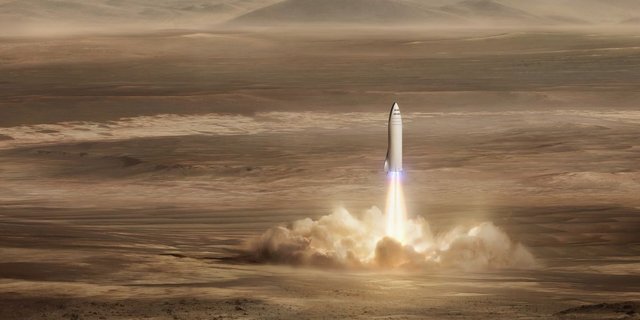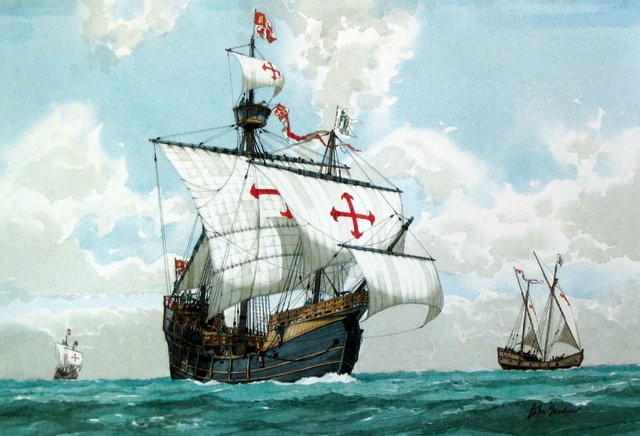Why should we colonise Mars?
The colonization of Mars is something people have been dreaming of for a long time and we know that there were plans to visit the Red Planet as early as the 20th century. Recently, the topic has revived again and we can say that it is becoming more and more popular from month to month. Mainly thanks to NASA and SpaceX. I encounter the following questions on the Internet: "Why go to Mars?” or "It would be better to choose the Moon" or even "It is better to stay on Earth than to invest in missions to Mars". In this article I will try to explain why it is our duty to colonize both Mars and other planets.
Let us go back to August 3, 1492, when Christopher Columbus and three ships left the port of the Canary Islands to travel to the unknown. He took a total of 90 people with him. Not too much for such an expedition. I think that each of them was aware from the very beginning of the dangers that would be waiting for them during the journey. On October 12, 1492, Columbus and his crew sailed to the coast of San Salvador, an island in the Bahamas.
Although he was not yet aware of the fact that he had discovered a land previously unknown to Europeans (he thought that he had arrived in the Japanese archipelago), this did not change the fact that his successful expedition began a new era in the history of mankind. A game that has had its shameful moments for mankind. I am talking here about the massacres of indigenous people in the Americas and the wars that have taken place on their territories. However, the discovery of America by European civilisation has had an incredibly positive impact on the European continent. Countries such as Spain and Portugal have become incredibly rich, and there have been great political and economic changes of a global and sustainable nature.
Almost 500 years later, a Saturn V rocket was launched from the USA as part of the Apollo 11 mission, which ended with the first ever human landing on the Silver Globe. Who knows, maybe a colonization ship will start from Mars in the future in the direction of distant stars. Mars, whose detailed plans of conquest were described by Wernher von Braun as early as in 1952.
Santa María - The largest of the three ships of Christopher Columbus
"Das Marsprojekt", a book written by von Braun, was published in 1952. The first analyses of the Mars expedition were carried out by this outstanding scientist in 1948, just after the end of the Second World War, in which von Braun took a part. On behalf of Adolf Hitler, he designed the V1 and V2 rockets, which were to help the Germans win the war. However, this did not happen, and von Braun was captured by the Americans and transported to the USA, where he fulfilled one of his dreams – he designed the Saturn V rocket, which carried people to the Moon. However, von Braun's plans were even more ambitious and went far beyond the moon's orbit. He dreamt of a mission to the Red Planet years before the Apollo program began.
The book "Das Marsprojekt" has gained huge popularity in the United States. The Martian mission planned by von Braun was to use 70 ships, each weighing 3,720 tonnes, to be launched with specially designed three-part shuttles. In order to deliver all the equipment into orbit, 990 trips of 46 such vessels would be needed. The colonization ships were to be driven by nitric acid or hydrazine, which would be rather inconceivable today. The landing on the Red Planet itself was to be done with engines, of which Elon would undoubtedly be proud. A funny surprise, as we already talk about Elon. In von Braun's book "Das Marsprojekt", the person in power on the Red Planet is called "Elon". This is not a fake.
In the mission described by the German, a single ship could take 70 people to Mars and each of them had the right to take 120 kg of personal luggage with them. The start from orbit around the Earth was planned for 1965. The mission assumed a 443-day stay on Mars and then a return to our planet.
It is also worth noting that the Saturn V rocket, designed by von Braun, had much greater capabilities than just delivering astronauts to the Moon. Von Braun hoped that NASA would turn its eyes to the Red Planet and that he would fulfill his greatest dream. However, this did not happen, and the Apollo program itself was cancelled earlier than planned. If von Braun had learned that in 2017 people did not even have a base on the Moon, he would have been very disappointed.
This is how the Martian base proposed by von Braun might have looked

After Apollo came the era of Space Shuttles, which had nothing to do with the colonization of the Moon or Mars, so let's jump straight to the present day. NASA has already failed to plan a mission to Mars for a long time. Now it seems that is is going to decide to go on a new mission to the Moon. There is also SpaceX, which plans to colonize Mars with its BFR system and has taken some steps in this direction. Large rocket, fully reusable, which will significantly reduce the cost of delivering the cargo into space. I keep my fingers crossed and hope it will work. But why should we follow in the footsteps of Columbus and discover the unknown? Isn’t it better to stay on a "safe" Earth?
Firstly, 'it is not advisable to keep all eggs in one basket'. From time to time, our planet is hit by natural disasters, such as eruptions of supervolcanoes, glaciations, or hits of other heavenly bodies. It would be a tragedy if a cosmic, wandering stone were to destroy our civilisation and turn into ashes everything that we have achieved so far. Our planet would probably be able to cope and recover, but without us. So it would be worth to have some backup in case of such an event. Such a backup would be easiest to make on a planet not too distant from ours.
We do not have the technology to travel to other systems, so the obvious choice is Mars, which, after a sufficiently long period of terraformation, can become quite a friendly place for humans. I am not saying that tomorrow or the day after tomorrow, asteroids will hit the Earth. We have no idea when this will happen. NASA and other agencies are doing their best to monitor space, but the incident in Chelyabinsk has shown that we cannot predict everything. Apart from natural disasters, our species may be decimated by an epidemic or another stupid war.
Secondly. Many people will say that, from an economic point of view, such an expedition does not make sense. Of course. This would be difficult to achieve at the moment. That is why SpaceX and others wants to reduce the cost of sending cargo to space as much as possible. They have, in part, already succeeded in doing so. The Falcon 9 is the cheapest rocket on the market in its class, and combined with partial reusability, the starting price of the rocket is falling even further. At the moment, the customer has to pay $62 million for a single Falcon start. For comparison, the least powerful version of the Atlas V costs $100 million. In order to reduce costs even further, a large, fully reusable rocket will be needed, which will be a BFR.
Once it has been built and the cost of launch is really as low as SpaceX is assuming, the only problem we will have is to bring thousands of people to the Red Planet in one piece and provide them the resources they need to live there. When the first colonies are established, it will be possible to start thinking about trade between Mars and the Earth. Gravitation on the Red Planet is three times weaker than on Earth, so you won't need a big rocket to be able to return to our planet. Mars is located much closer to the asteroid belt, where it is full of raw materials. Asteroid missions are already planned to extract a variety of valuable materials. The earthling would be willing to exchange raw materials for, let's say, the fertiliser that might be needed on Mars to grow plants, or simply for money. In terms of safety, there is no doubt that, during a 3-4 month flight, people will sometimes die as a result of unforeseen coincidences or illnesses. Certain things are unavoidable during such a large undertaking as the colonization of Mars. We could safely send 6-10 astronauts to fly there, leave the flag, collect a few stones and come back, but that's not what we're looking for.
And thirdly. We are a civilization of explorers and we have in our genes an infinite curiosity that has led us to where we are today. For thousands of years we have been looking into the stars and we are curious what kind of worlds are hidden among them. Mars is one of them. It is not without reason that at the beginning of the article the expedition of Columbus and the great dream of von Braun were mentioned. Columbus is just one example. In the past there were many sailors who discovered a lot of previously unknown lands. Today, when our planet is better known to us, there is still no lack of explorers and daredevils. People keep climbing Mount Everest and reaching the North Pole. Scientists are building new devices and conducting research, thanks to which we get to know the secrets of the universe better. Daily discoveries lead us to further discoveries and that way we try to satisfy our curiosity.
We have to fly to Mars and even further. There is our place. We are the only such intelligent species on our planet and at the moment we don't know if it's not the only one in our Universe. It would be terribly silly to stay in such a situation on our "safe" Blue Dot and not to learn all the secrets hidden by the Universe.
If you like my text, please consider leaving an upvote and subscribing my profile. In response to possible positive reactions, I will be happy to write more similar texts.


